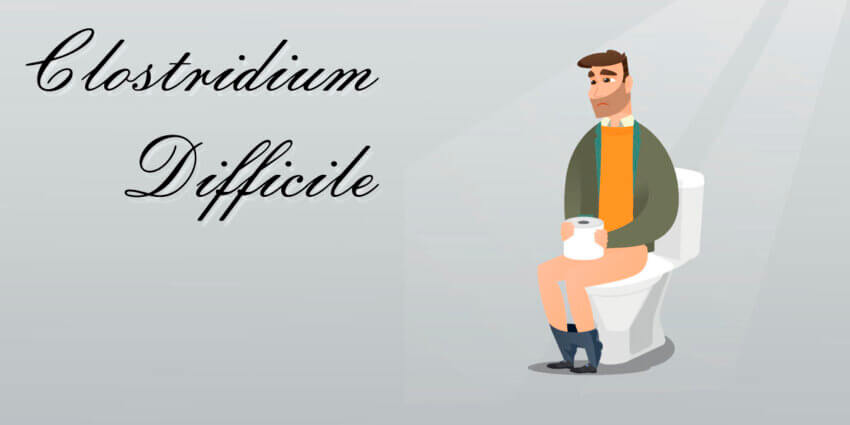Clostridium difficile (c.diff) bacteria is the cause of up to 500,000 intestinal infections each year. It is also one of the leading antibiotic resistant infections we face. To make matters worse, it can often be hard to get rid of and has a very high recurrence rate.
Over 15,000 people per year die from c.difficile, mostly people over the age of 60; younger people usually just get really sick. Many of us are walking around with antibiotic resistant c.difficile in our colons and don’t even know it (however, these people can be carriers and may spread the infection). Those people may be just one antibiotic treatment away from getting very sick. Antibiotics will kill their good bacteria (our primary defense against c.diff) and not harm resistant c.difficile at all, thus allowing it to flourish!
“C. diff, as it is called, can be found in very low concentrations in the colons of healthy people. It usually minds its own business. But C. diff can wreak terrible damage when competing bacteria in the gut are wiped out by antibiotics. In a compromised colon, C. diff spreads like wildfire. It can double itself every twelve minutes and dominate the intestine in a matter of hours. C. diff produces two or three toxins that it uses to coax the epithelial cells lining the colon to do its bidding. This helps it live but injures human cells. When the toxins spew forth, the colon becomes as porous as toast.” — Blaser, Martin J., MD (2014-04-08). Missing Microbes: How the Overuse of Antibiotics Is Fueling Our Modern Plagues (p. 186)
Even though antibiotic usage is the most common cause of c.difficile, it is also the most common treatment for it. But there are other options, ones that do not destroy what is left of your microbiome.
Table of Contents
Risk Factors
- Recent antibiotic use. Antibiotics can trash the beneficial bacteria in your gut and leave antibiotic resistant strains untouched. This can cause the c.difficile bacteria to grow rapidly and mostly unchecked.
- Visiting or staying in a hospital, clinic, or elder care facility. Of course some people may experience both a hospital visit and antibiotic usage on the same day.
- Weak microbiome – often caused by a diet high in sugar and low in fiber and other prebiotics. Strong “kill” supplements can do more damage to your microbiome than antibiotics!
- Over the age of 65
- A weakened immune system
- Previous c.difficile infection
Common Symptoms
- Diarrhea – watery, at least 3 watery bowel movements per day, for at least two days. Severe symptoms can be 10 or more watery stools per day
- Abdominal Pain
- Swollen Abdomen (including a dangerous condition called megacolon)
- Loss of appetite
- Blood or puss in stool
- Nausea
- Fever
- Colitis (inflammation of the colon) – c.difficile is one cause of this
Natural Treatments
The following have all been found in scientific research studies to be beneficial in the treatment of c.difficile.
“Based on this systematic review and meta-analysis of 31 randomized controlled trials including 8672 patients, moderate certainty evidence suggests that probiotics are effective for preventing CDAD (NNTB = 42 patients, 95% CI 32 to 58)” — PubMed ID# 29257353 CDAD= Clostridium Difficile–Associated Disease
- Bacillus Subtilis – A probiotic strain that has been shown in several studies to help with a c.difficile overgrowth. An enhanced version of this strain is found in Phage Complete and has studies of its own.
“we used spores of Bacillus subtilis, a bacterial species already widely associated with probiotic use, to suppress symptoms of C. difficile CDI. Our objective was to assess the capacity of this bacterium, as a probiotic, to protect against disease.” — doi.org/10.1111/1574-6968.12468
- Saccharomyces Boulardii – (see PMID #PMC98222)
- Clostridium butyricum (MIYAIRI 588) – it comes from Japan and has been used there for many years to treat c.difficile infections. Search for it on eBay.
- Probiotics – Some research has shown probiotics to reduce the risk of contracting c.difficile after antibiotics by 50%. Again, Phage Complete is one of the best probiotics for gut health on the market.
“Probiotics in the prevention of antibiotic-associated diarrhoea and Clostridium difficile infection: Seven (studies) tested various strains of Lactobacillus and/or Bifidobacterium and all showed a preventative effect for antibiotic-associated diarrhea.” — PubMed #PMC3105609
- Larch Tree fiber – See page 389 in The Gut Health Protocol for study info
- Zeylanicum (Ceylon) cinnamon oil – all essential oils should be mixed in a carrier (such as coconut oil) when taking and consumed with water (see study below). See this page for important usage information.
- Clove Oil – see note above about essential oils
- Kefir – homemade from kefir grains is best, otherwise commercial also works. (see study link below)
- Avoid anything that kills large amounts of good bacteria, this includes many natural supplements. See The Gut Health Protocol for further information on this topic.
If you and your doctor can not get rid of the c.diff infection and/or it keeps coming back, you should discuss having a Fecal Matter Transplant (FMT) with your doctor. FMTs may need to be repeated several times, but using them with the advice above should improve their efficacy.
Studies
“Another randomized, double-blinded, placebo-controlled clinical trial investigated the use of Bacillus subtilis therapy during antibiotic consumption as well the occurrence of Clostridium difficile associated diarrhea (CDAD)… Treatment with Bacillus probiotics during antibiotic therapy significantly decreased the incidence of antibiotic associated diarrhea (AAD) and adverse effects related to the use of antibiotics. Furthermore, Bacillus subtilis was well tolerated by the patients without side effects (Horosheva et al, 2014)” — DE111 FDA GRAS Notice #831 (pdf)
“perturbations of the intestinal microflora may, in turn, lead to a range of diseases, including inflammatory immune diseases such as Crohn’s disease, insulin resistance, obesity, cancer and infectious diseases such as CDI (Clostridium difficile infection)… probiotics have potential as prophylactics in the prevention of CDI” – DOI #10.1099/jmm.0.058933-0
“The incidence of CDI (Clostridium difficile infection) has dramatically increased in recent years, partly due to the emergence of a number of hypervirulent strains. The most commonly documented risk factors associated with CDIs are antibiotic usage leading to alterations of the gut microbiota.” (PubMed #23699066) (Full Text)
“In human studies, S. boulardii treatment significantly reduced the incidence of simple antibiotic-associated diarrhea. S. boulardii also reduced the risk of subsequent relapse in patients with a history of multiple episodes of C. difficile diarrhea.” — PMID #PMC98222
“Daily administration of the probiotic Kefir given in combination with a staggered and tapered antibiotic withdrawal regimen may resolve recurrent Clostridium difficile infection as effectively as fecal microbiota transplantation (FMT).” — Oxford Journals
“There were 30 different studies evaluating the in-vitro anti-microbial properties of CZ (Cinnamomum zeylanicum)… Accordingly CZ has shown potential anti-microbial action against a wide variety of bacteria (… Clostridium difficile, Clostridium perfringens, Enterobacter aerogenes, Enterobacter cloacae, Enterococcus faecalis, Enterococcus faecium, Escherichia coli, Haemophilus Influenza, Helicobacter pylori, Klebsiella pneumonia, Listeria ivanovii, Listeria monocytogenes, Mycobacterium smegmatis, Mycobacterium tuberculosis… ” — PMID #PMC3854496
Bacillus Subtilis DE111 Benefits – Including how it helps with a C.difficile infection
All images posted by John Herron are either "Copyrighted John Herron", or are copyrighted by someone else and are used under license. So please don’t use them elsewhere, you’ll get in trouble.


 Phage Complete comes with a full 30 day money back guarantee, for U.S. purchases this includes the original shipping charges to you!
Phage Complete comes with a full 30 day money back guarantee, for U.S. purchases this includes the original shipping charges to you!